- Home
- Jim Thompson
South of Heaven Page 2
South of Heaven Read online
Page 2
Still, a hard crack with a gun barrel can have a sobering effect even on a twenty-one-year-old, and mine had taken quite a little of the perkiness out of me. I took a long look at myself, trudging along in the dust, with my hat brim turned up front and back and my belly burning with before-breakfast booze. And the picture wasn’t a nice one at all. There was nothing romantic or dashing about it. I was a drifter, a day laborer, a tinhorn gambler—a man wasting his life in a wasteland. That’s what I was now. That’s what I’d be in another twenty-one years if I lived that long, unless I started changing my ways fast.
I told myself that I would. The telling made me feel better, sort of removing the need, you know, to actually do anything.
I began to whistle, planning what I’d have for breakfast, planning how I’d spend my five dollars. Because, of course, I was going to blow it. That was what money was for, and there was always more where the first came from. Always and always.
There is no end to always when you’re twenty-one.
I began to walk in time with my whistling. Sort of marching in time to it. Marching onward and upward to some vague but lofty goal. Or so I saw myself that long-ago morning.
What I was actually heading into was the big middle of the biggest mess of my thoroughly messed-up life.
3
I suppose most of us aim a lot higher than the place we actually hit. Most of us mean to do better than we wind up doing. I know I did, anyway. In the beginning, that is.
I worked hard in school and I got better than good grades. The teachers at the consolidated high school in my native Oklahoma had pointed me toward college and put out feelers for scholarships. My grandparents—my only living kin—had done everything they could to help me, wanting for me what they had never had for themselves. Everyone was pulling for me, and I was doing plenty of pulling on my own. According to the high school yearbook, I was the student most likely to succeed. And no one could have convinced anyone that I wasn’t.
Then, when I was just short of sixteen, my grandparents blew themselves up, and everything else seemed to blow up right along with them.
My grandma and grandpa, God bless them, sharecropped sixty acres of the world’s sorriest land. Stab a stick down anywhere, and you’d hit rock after about eighteen inches. They needed a new privy, and, since you couldn’t dig in the rock, grandpa got half a box of dyna from the landlord’s store. He was used to working with it; so was I and so was grandma. You live on a rocky farm long enough and you don’t think much more of a stick of dynamite than you do of a stick of candy.
I was about a half mile away, coming home from school, when I heard the explosion. And even that far away I could hear grandma scream. It seemed like I ran forever before I got to where she and grandpa were; and by then—well, I don’t want to talk about it. I don’t want to remember what they looked like. Because what it was, wasn’t people.
I’m not sure how it happened. But I suppose a charge misfired on them. They waited a while, making sure that it wasn’t going to explode. Then, they started to put a new cap and fuse on it. And then, then just when they were bending over it…
Don’t tell me Dyna’s a good girl, that it isn’t dangerous. I know better.
As I say, I was just short of sixteen at the time of the accident; in another month, I’d have graduated from high school. But I didn’t wait around to do it. I knew what happened to sixteen-year-olds who didn’t have kinfolk, and I didn’t want any part of it.
I went down and hid in the weeds along the railroad right-of-way. I caught the first freight train that was traveling slow enough to catch and I kept right on going.
The wheat harvest all the way to Canada. The stoop crops in California. The apples in Washington and Oregon. The potatoes in Nebraska and Idaho and Colorado. And then the oil fields and the big construction jobs through the Midwest and West and Far West. I’d made plenty of money to finish my education—college and anything else I wanted. I’d made plenty, and peed it all off.
A couple of years ago, Four Trey Whitey and I had worked almost six months steady, and, what with gambling, I came off the job with around six thousand dollars. And the Lord only knows how much Whitey had. So we went into high livin’ Dallas and got a suite at the biggest hotel in town, and then we got drunk. And stayed that way.
Just booze—no women. Whitey was impotent, I think, so it wouldn’t have been polite for me to suggest women. I probably wouldn’t have, anyway, since I’d been raised a strict Baptist, and when you drink like we did you don’t think much about sex.
At the end of the month we were both broke, and I was having the d.t.’s. But Four Trey managed to get me into the county hospital alcoholic ward before he left town. That was his way; nice and considerate up to a point, but not taking anyone to raise. He’d work with you or go on a party with you, but he was a loner—a guy who didn’t want anyone hanging on him. And he could get awfully damned sharp if you got in his way. So.…
So here I was again, trudging the red dust of another God-forsaken town, starting out on another job in the wilderness. And telling myself that this time it would be different, that I would be different.
I was walking past the deserted hotel when I heard the sound of voices, sort of mumbling and singing, and I stooped down and looked under the porch. Three boes were under it, sprawled around a big old-fashioned chamber pot and sipping from its contents.
I figured, correctly, that they’d stolen the pot out of the hotel and what they had in it was anti-freeze mixed with water from the Pecos. But I called to them, kidding.
“You boys getting pretty hard up drinking pee, aren’t you?”
They whooped and hollered. “Best you ever tasted, Tommy. Come an’ join us.”
I said thanks, but I guessed not. “Bud Lassen’s in town. Maybe you’d better play it kind of low.”
They all said what Bud Lassen could do to himself, and what they’d do to him. “Hey, listen, Tommy. I got a new joke about pipeliners.”
It wasn’t new. I’d probably heard it a hundred times—a kind of dirty dialect joke. But I listened to humor them:
“Mammy, mammy! Big bunch o’ pipeliners comin’!”
“Hush yo’ mouf, gal! Them pipeliners screws each other an’ does their own washing.”
“That’s rich,” I said. “Very funny. Well, you boys be good.”
I hurried on before they could stop me, and their singing trailed down the street.
Throw out the lifeline,
Here comes the pipeline.
Some bo is going to drag-up!
An old Dodge panel truck was parked a couple of doors down from the Greek’s restaurant. A panel truck fixed up like a housecar, with windows cut into the sides and the top knocked out and hooped over with canvas to make it higher. The rear tire was flat, and a kid in jeans and jumper and a stocking cap was trying to pry it off the rim. He couldn’t do it, because he hadn’t let all the air out of it. Which made him a pretty dumb kid in my book.
I spoke to him, pointing out what he had to do. But he was hunkered down with his back to me, and his stocking cap apparently kept him from hearing. So I put my foot out and toed him in the butt.
There was a wild shriek. He rose straight up in the air, and his stocking cap flew off, and—and it wasn’t a he. It was a girl.
And was she ever mad! And was she ever pretty! And was she ever built!
4
She was just about the teensiest little ol’ girl that ever lived—short, I mean, and weighing maybe about ninety-five pounds. But the way she stretched her clothes, it was kind of a case of the parts being greater than the whole. She drew back her hand as though to slap me, and then she asked just what I thought I was doing, and just who did I think I was. And before I could answer her, she asked just what I thought I was looking at.
“Well?” she demanded, her eyes blazing. “Do you want me to take them out and show them to you? Do you, you big stupid goof!”
“Ma’am,” I said. “Ma’am, I—I—
”
“Or maybe you want me to take my pants down and show you my bottom,” she said, adding that I seemed to like to play with it. “That’s what you really want, isn’t it? To get my pants down so you can kick me again!”
“Please, ma’am,” I said. “I didn’t know you were a girl. I mean, your back was to me and you had that stocking cap on and your jumper was hanging down over your, uh—how was I to know, anyway?”
“I’ll bet! I’ll just bet,” she said, but she didn’t sound quite so angry. “Just where is this pipeline job I’ve been hearing so much about?”
I told her the job wasn’t going to start until tomorrow, but the beginning of it was up the river about five miles. “Come out in the street and I’ll show you.”
She went with me, a little stiffly, and I pointed—far, far away up the Pecos. They were just specks from here, blinking and winking as the sun hit them—the rows of sleeping and office tents, and the hundred-yard-long chow tent. But you could see a long way out there, if your eyes were used to it, and I could even identify the tractorlike generators, and the strungout lengths of pipe—looking like matchsticks from this distance—and an antlike speck, moving here and there, which had to be the camp guard. But the girl looked up into my face, frowning suspiciously, apparently unable to see a thing.
“Are you sure you know what you’re talking about?” she said. “You’re not just teasing me or something?”
“I’m sure,” I said. “I’ll be up there working this time tomorrow.”
“But”—she made a helpless gesture. “But why does the pipeline start here? What are they going to put in it?”
“Take another look,” I said. “Off over this way.” I pointed again, and she moved in close to me to sight along my arm. It made me feel so prickly and funny that I could hardly keep my mind on what I was saying. And it kept me from wondering about quite a few things that I might well have wondered about. For instance:
She was no tourist; she had come here, knowing what she was coming to—a girl with a purpose. Yet she apparently knew nothing at all about it. She was smart; you knew that at first glance. But her behavior, some of the things she said, were downright dumb. And that cut-down Dodge of hers was a very solid job—someone had put a lot of work and money into it. And the tires were top-of-the-line and practically new.
It was a car that would take you anywhere and out again. And do it fast. And why it had taken her here, why she should be here at all…?
Well, you see? But I didn’t. Not at the time.
“See off over there,” I said, her black hair brushing against my face. “Do you see all those pumping jacks?—Hundreds and hundreds of them stretching off to the horizon.”
She shook her head, saying rather crossly that she couldn’t see a thing. I said that was natural enough, I supposed, the stuff being so old and weathered practically the same color as the landscape.
“But, anyway, that’s an oil field. What used to be the largest shallow oil field in the world. It’s pretty well pumped dry now, but there’s more natural gas here than you’ll find any place in the country.”
“What are those?” She squinted. “Like matches being lighted! There!…There goes another one!”
I told her those were flambeaux. Big steel torches running up into the air to burn off the gas, so it wouldn’t drift around and cause trouble.
“That’s what this pipeline is about,” I went on. “They’ll build a big casinghead plant around here somewhere to dry out the gas and then they’ll pump it down to Port Arthur.”
She nodded, thanking me and drawing away again. She said she guessed she’d better get back to fixing the tire; and I said I was sure it was the valve rather than the tire and I could fix it in a minute. But why didn’t we have some breakfast first?
“Well…” she hesitated, “I could use some coffee. I was driving all night, and…and…Are the restaurants very high out here?”
“Not for out here. Five to ten cents for a glass of water, and other things accordingly. But don’t you worry about that,” I said, taking her arm. “This is on me.”
She came along without much urging. The Greek stopped us at the door, making me show my money before he would let us in. Which was reasonable enough in a town with six hundred floaters and a normal population of less than fifty. I let him see the five, and we went on back to the kitchen to wash up.
The cook was skimming a stew with a big spoon, and taking a swig now and then from a pint bottle of vanilla extract. He was lean and mean-looking, and I figured that if you looked in his pocket you would probably turn up a Wobbly card. Almost all oil-field cooks were Wobblies—members of the I.W.W. To their way of thinking, Eugene Debs was a conservative, and about the only person they had any use for was Big Bill Haywood.
They all hated the bosses; just any bosses. Most of the time they were about half-stewed on flavoring extract, which gave them belly pains and made them a lot meaner than they normally were.
“Hist,” he said, jerking his head at me as I started to dipper water into the wash basin. “Don’t use that goddam river water (excuse me, lady). Why save money for a goddam Greek capitalist (excuse me, lady)?”
He filled the basin with about three dollars’ worth of drinking water. As we began to wash, I gave him our breakfast order—hot cakes, ham and eggs, and coffee. He said we’d get the goddam meat for free (excuse him, lady), so never mind ordering it.
“And don’t hurry so goddam fast, will you? I’ll fix you some scoff to take with you.”
We were moving kind of carefully when we went back into the restaurant because we both had a couple of big sandwiches stuffed down inside our shirts. We ate breakfast pretty carefully, too, since the Greek kept shooting glances our way, and we’d got a lot more than our check showed. Each of us had a big slice of ham hidden under our eggs, and there was about a pound of butter under our hot cakes.
In retrospect, there doesn’t seem much to have laughed about. We were cheating an honest businessman, and, if anything, we should have been ashamed of ourselves. Still, to us, a couple of youngsters come together, sharing with each other, the situation was funny as all hell. We’d quiet down for a minute and concentrate on our food. And then our eyes would meet, and that would set us to laughing all over again. We were laughing and carrying on so much that our food was cold before we’d finished it all.
Of course, the Greek caught on to what had happened, and he didn’t think it was a bit funny. I figured on getting about two dollars change back from my five. But what he gave me was fifty cents. I started to argue about it, and he got all excited and red in the face and began hollering.
The cook came to the kitchen door and looked out. Then he came out, waving a meat cleaver as he headed toward the Greek. The Greek grabbed up a sawed-off baseball bat. Carol—that was the girl’s name—Carol and I got the heck out of there.
I’d been right about the tire. All it needed was some pumping up and an adjustment of the valve. We worked on it together, making a job out of it, you know. Hunkered down side by side in the red dirt like kids playing at mud pies. Along toward the last, Carol turned to me just as I turned toward her, and our faces were barely an inch apart. We looked at each other, hardly breathing. Her eyes seemed to get bigger and bigger, and her mouth softer and softer. Her lips parted. They moved toward mine, and her eyes started to drift shut, and…
Fruit Jar drove up.
He wheeled into the curb, bouncing the Model-T’s tires against it. He hollered at me, motioning for me to come over to him. I did so, taking my time about it. Wondering how he’d managed to get the heat which he was obviously full of.
“Let’s have some stash, Tommy,” he demanded, and I stepped back a little to avoid his breath. “We got to get over to Matacora.”
“What for?” I said.
“Because,”—he caught himself, his mouth growing crafty—“Give me the dough, Tommy. I ain’t taking you if you don’t.”
I said I’d give him fifty ce
nts if it would do him any good. He snatched it out of my hand, red eyes glaring at me from behind his sunglasses. “You got more than that! You and that broad were scoffing in the Greek’s!”
“So?” I said.
“So where did you get the stash?”
“Where did you get it for that load of heat you’re carrying?”
He let out a string of curses. He said it would be his happy ass if I ever rode with him again, and I said I wouldn’t ride with him again if I was paid to.
He revved the motor, cursing. The car shot backwards, then stopped as he turned to yell at me.
“Better start walking, you cheap chiseling punk! They’re hiring on in Matacora!”
He drove away fast, figuring maybe that I’d throw something at him. I watched, grinning, as he stopped at the garage gasoline pump, a couple of blocks away. He was falling for a rumor, of course, the kind that’s always floating around a jungle. It didn’t make any difference to me if the line was hiring in Matacora, since I already had a job nailed down, but I knew that they weren’t. All the men were waiting here. What sense would it have made to have them go all the way over to Matacora, and then have to be hauled back?
Carol came up and asked if there was any trouble. I said that there wasn’t a bit, and we could get back to fixing the tire.
“It’s already fixed, Tommy. You know that.”
“Well, yeah,” I said. “I guess it is, isn’t it?”
“Yes,” she said. “Yes, it is, Tommy.”
We looked at each other. I held out my hand and said, well, I guessed I’d better tell her good-bye. “I mean, I guess I’d better tell you,” I said, “because I reckon a girl like you wouldn’t want to kiss a fellow good-bye that she’s just met. Right out in public, I mean.”
She took my hand and squeezed it. Staring down at the ground and then slowly raising her eyes to look up into my face.

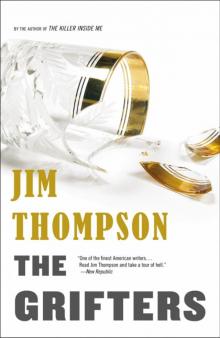 The Grifters
The Grifters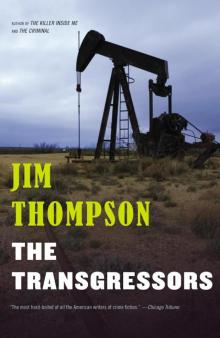 The Transgressors
The Transgressors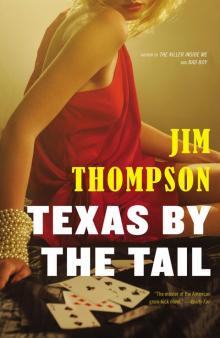 Texas by the Tail
Texas by the Tail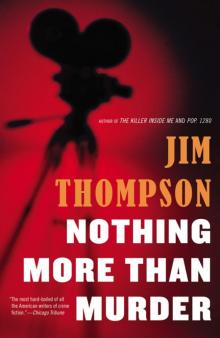 Nothing More Than Murder
Nothing More Than Murder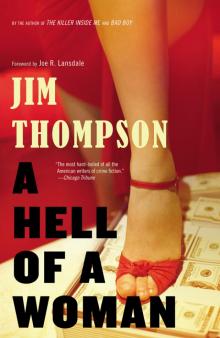 A Hell of a Woman
A Hell of a Woman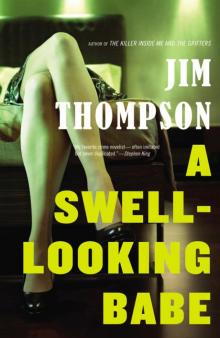 A Swell-Looking Babe
A Swell-Looking Babe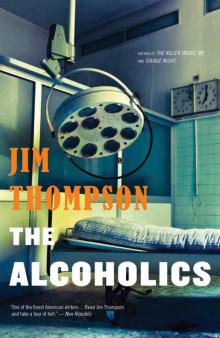 The Alcoholics
The Alcoholics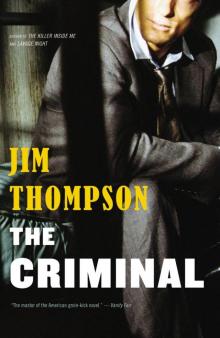 The Criminal
The Criminal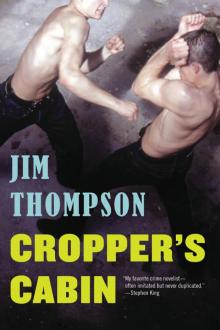 Cropper's Cabin
Cropper's Cabin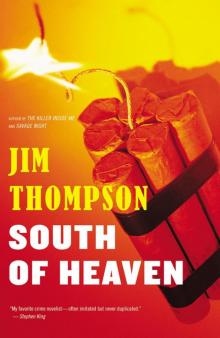 South of Heaven
South of Heaven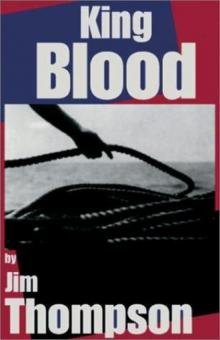 King Blood
King Blood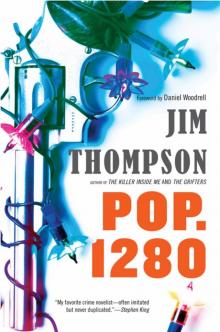 Pop. 1280
Pop. 1280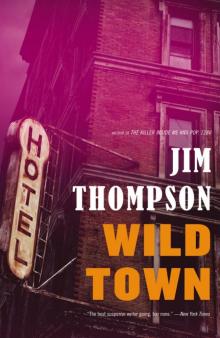 Wild Town
Wild Town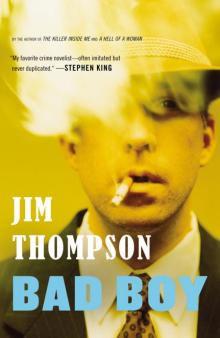 Bad Boy
Bad Boy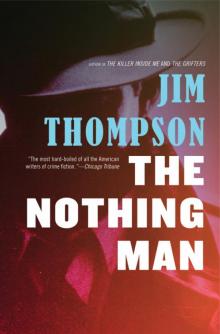 The Nothing Man
The Nothing Man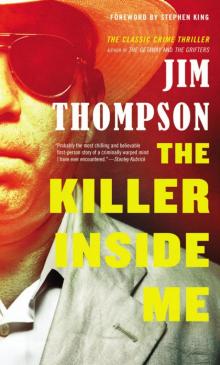 The Killer Inside Me
The Killer Inside Me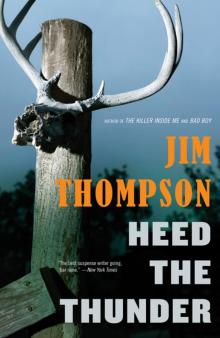 Heed the Thunder
Heed the Thunder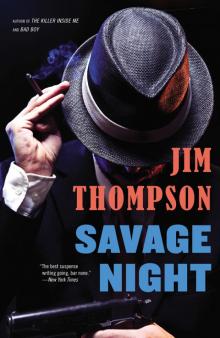 Savage Night
Savage Night Recoil
Recoil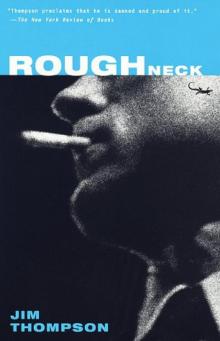 Roughneck
Roughneck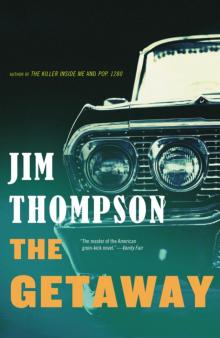 The Getaway
The Getaway